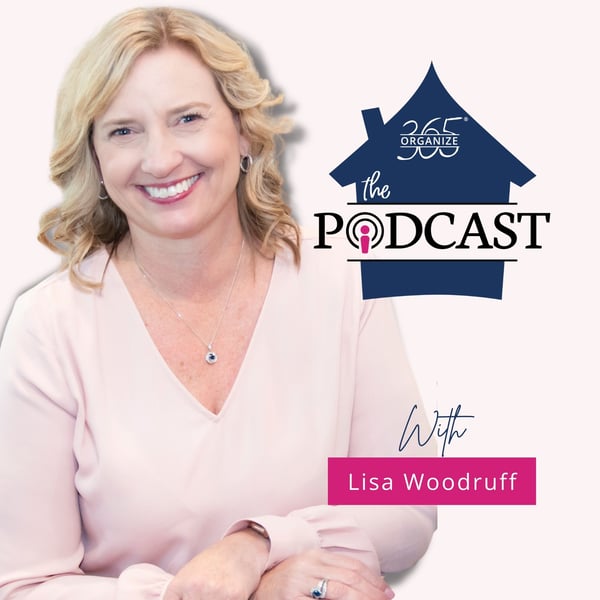170 - How Caring for Family Members Affects Your Organizational Phase of Life
Organize 365 Podcast
Lisa Woodruff
4.5 • 1.3K Ratings
🗓️ 12 May 2017
⏱️ 29 minutes
🧾️ Download transcript
Summary
Last week, I introduced you to the 4 phases of life and how when you have your babies can impact upon your phase of life.
This week, I explore this topic even further and share with you how caring for family members can also affect your organizational phase of life.
Having a baby, the topic of last week's podcast, is a welcome and joyous life event. When you have a baby, you're thrust into the accumulation phase. All of those toys...food...clothes...furniture...!
This week's focus is on when you become a caretaker for a family member.
Unfortunately, when you become a caretaker of a family member, that's not such a joyous life event.
Sometimes we'll see it coming and have a gradual lead in, other times it rocks our world in an instant!
Often this will be due to medical emergencies, like when a loved one falls and breaks their hip...which I've found in recent years is a real thing and it happens A LOT!
I can share from first-hand experience that being a caretaker is EXTREMELY time consuming.
You have an immediate prioritization shift in your life.
You're thrust into having responsibility over two sets of everything...two households, two sets of bills, etc.
Whatever stage of life you were previously in, when you become a caretaker, you're also now in the survival phase, too.
In this podcast episode, I share with you some really useful ideas on how to cope if this happens to you.
I also have two super useful products that are designed to help you keep track of, and ultimately share when needed, important personal information.
One focuses on medical information (i.e., insurance, current and past prescriptions, medical history, etc.).
The other focuses on financial information, mainly for spouses to keep a joint record (i.e., bank details, etc.).
They are editable so you can fill one in for yourself, another for your parents, and I even fill the medical record out for my children. It's just so useful to keep all the information that you have in one simple record.
Next week, I look at how losing a close family member can affect your phase of life. I'm sure you can guess what phase you find yourself in when that happens!
Full blog post can be viewed at organize365.com/170
A special thank you to this week's podcast sponsor, the National Association of Senior Move Managers!
Transcript
Click on a timestamp to play from that location
| 0:00.0 | Welcome to the Organized 365 Podcast. My name is Lisa Woodruff and I'm a professional |
| 0:07.4 | organizer and blogger in Cincinnati, Ohio. I want to help you get your |
| 0:11.8 | home organized and help you organize life stages and |
| 0:15.8 | unexpected events. So sit back, relax, and let's get organized. |
| 0:21.1 | Last week I shared Let's get organized. |
| 0:30.0 | Last week I shared that when you have your babies can somewhat impact the phase of life that you're in. All right, so the four phases of life that I say a woman goes through is childhood, accumulation, which is usually |
| 0:37.7 | your 20s and 30s, survival, which is 40s to 55, and then 55 plus is downsizing and legacy. |
| 0:45.8 | These aren't in stone. |
| 0:47.1 | I mean they overlap a little bit and you can find that you're in more than one stage |
| 0:51.6 | at a time. |
| 0:52.3 | So I mentioned that, well, everyone in their 20s and early 30s |
| 0:56.3 | is accumulating houses and spouses and jobs and kids. |
| 0:59.7 | And basically, if you want to hang up a picture, |
| 1:02.0 | you're going to need to buy a hammer and nails. |
| 1:04.4 | You need the tools even to do the projects when you're in your 20s and 30s, whether you have children |
| 1:09.6 | or not. |
| 1:11.2 | But if you have your children later in life, let's say in your 40s, you're still in the survival stage because your 40s and 50s are your highest income earning years. |
| 1:20.0 | It's the highest percentage of women working in the United States in the workforce, and |
| 1:26.1 | it's often when the older generations in your family need your help as well. |
| 1:31.0 | So you have caregiver responsibilities on you even if you don't have |
| 1:35.1 | children. So if you decide or if for whatever reason you have your children |
| 1:40.5 | starting in the late 30s and early 40s, you're going to add that accumulation |
... |
Please login to see the full transcript.
Disclaimer: The podcast and artwork embedded on this page are from Lisa Woodruff, and are the property of its owner and not affiliated with or endorsed by Tapesearch.
Generated transcripts are the property of Lisa Woodruff and are distributed freely under the Fair Use doctrine. Transcripts generated by Tapesearch are not guaranteed to be accurate.
Copyright © Tapesearch 2025.

